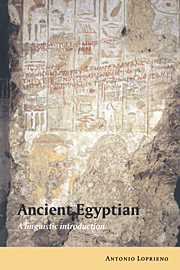Book contents
- Frontmatter
- Contents
- Preface
- Major Chronological Divisions of Egyptian History
- 1 The language of Ancient Egypt
- 2 Egyptian graphemics
- 3 Egyptian phonology
- 4 Elements of historical morphology
- 5 Nominal syntax
- 6 Adverbial and pseudoverbal syntax
- 7 Verbal syntax
- Epilogue
- Notes
- References
- Index of passages
- Index of morphemes
- Index of lexemes
- Index of topics
7 - Verbal syntax
Published online by Cambridge University Press: 08 December 2009
- Frontmatter
- Contents
- Preface
- Major Chronological Divisions of Egyptian History
- 1 The language of Ancient Egypt
- 2 Egyptian graphemics
- 3 Egyptian phonology
- 4 Elements of historical morphology
- 5 Nominal syntax
- 6 Adverbial and pseudoverbal syntax
- 7 Verbal syntax
- Epilogue
- Notes
- References
- Index of passages
- Index of morphemes
- Index of lexemes
- Index of topics
Summary
Introduction
The treatment of verbal phrases has experienced an ironical dichotomy in contemporary Egyptological linguistics: on the one hand, the variety of morphological forms and semantic functions has been analyzed in detail for all the phases of the language; on the other hand, the dominant approach to the study of Egyptian syntax, the so-called “Standard theory,” has downplayed the role of the “verbal phrase” (VP) as a syntactic category, viewing most of the instances in which a verbal form appears in an Egyptian text as conversions of the verb into the syntactic functions of a noun phrase (NP), an adjective phrase (AdjP), or an adverbial phrase (AP). The study of verbal phrases as predicate of the sentence, therefore, has played a relatively minor role in Egyptological linguistics from the late sixties onward, being rather superseded by a syntax of verbal forms in non-verbal functions.
This approach, however, has been challenged in recent years and is now being replaced by more verbalistic accounts of Egyptian syntax (section 6.2). The fundamental contribution of the Standard theory to our understanding of Egyptian syntax remains the recognition of the extreme functional versatility of Egyptian VPs when compared with their equivalents in European languages: while in most syntactic environments verbal forms do keep their function as clausal predicate, they also exhibit a proclivity to be embedded into syntactically higher units. We have already considered the use of a participial VP in the focalized cleft sentence in section 5.4 and the conversion of a VP into an adverbial phrase in section 6.3.2. Egyptian verbal phrases can also be embedded via topicalization (section 7.5) or relativization (section 7.7).
- Type
- Chapter
- Information
- Ancient EgyptianA Linguistic Introduction, pp. 183 - 236Publisher: Cambridge University PressPrint publication year: 1995



